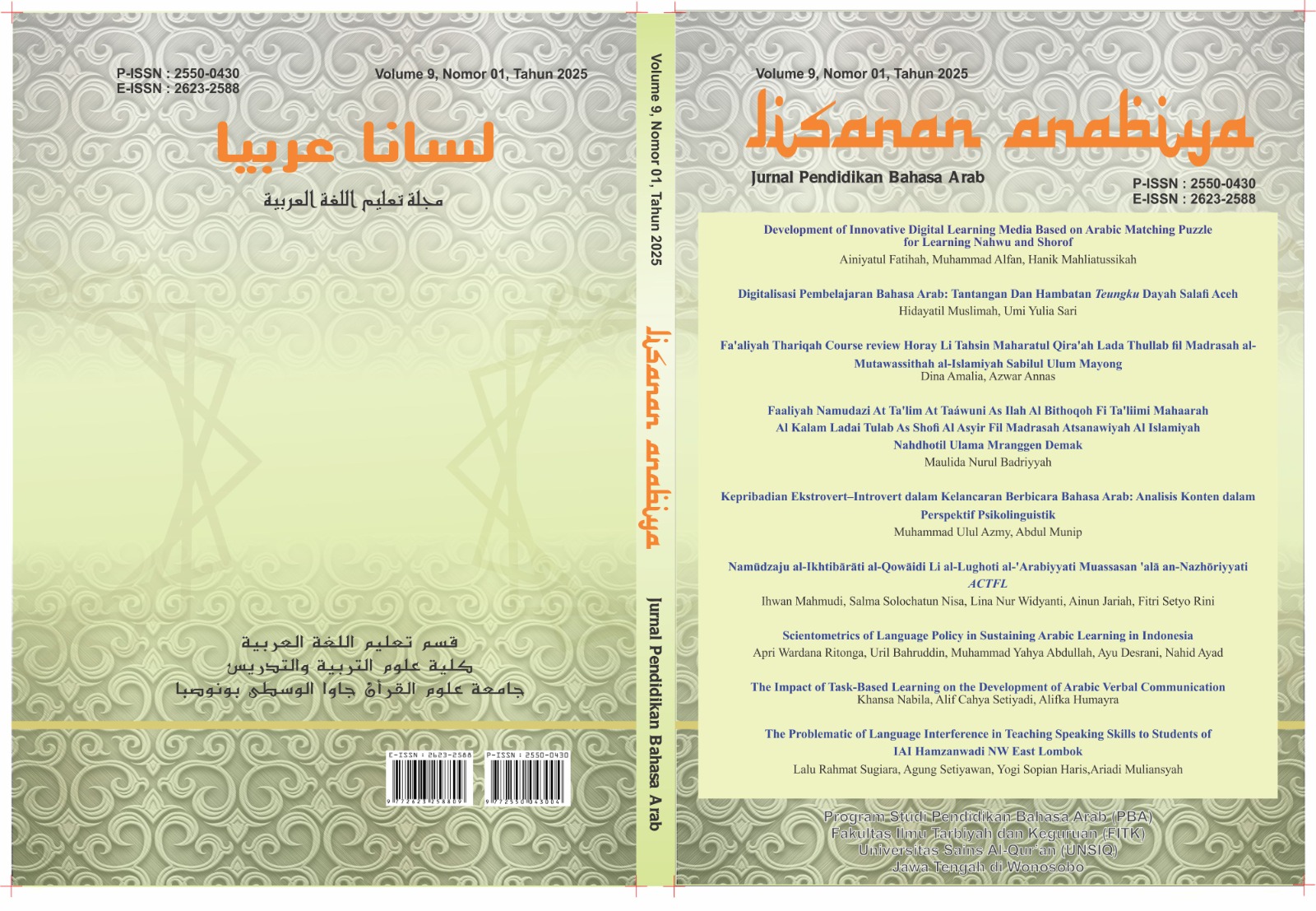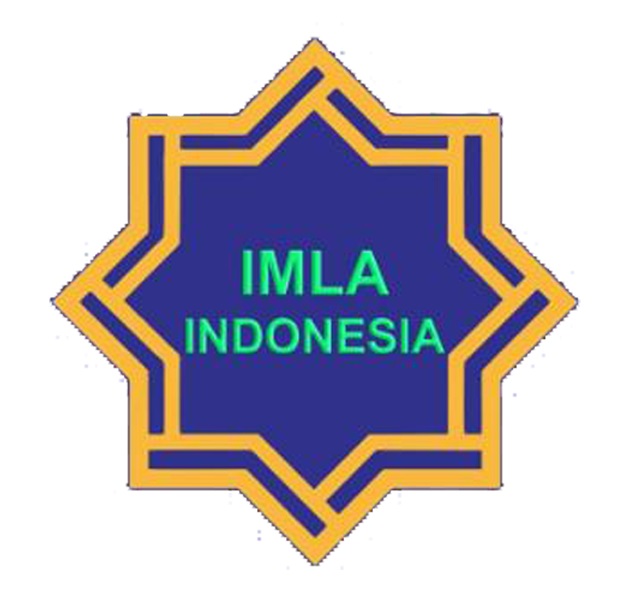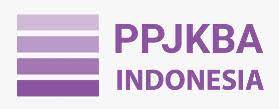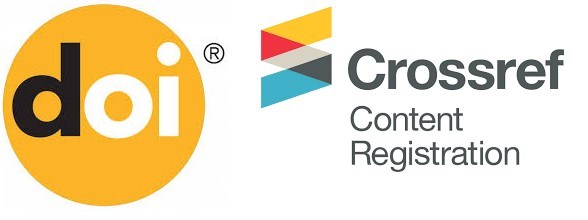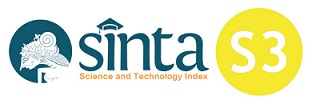The Impact of Task-Based Learning on the Development of Arabic Verbal Communication
Abstract
Mastery of verbal communication in Arabic is a major challenge in the Islamic boarding school environment which is still dominated by memorization and grammar methods. This study aims to evaluate the impact of Task-Based Learning (TBL) on the development of students' speaking skills at Darussalam Gontor Modern Islamic Institution. Using a qualitative approach with a case study, data were collected through interviews, observations, and documentation, then analyzed thematically. Results showed significant improvements in verbal participation, confidence, grammatical accuracy, and learning motivation. The use of Arabic outside the classroom also increased, signaling successful transfer of learning. The findings support the effectiveness of TBL in the context of religious-based Arabic education and offer a new direction for communicative curriculum design. Future research is recommended to utilize a longitudinal approach and triangulation of methods to extend the understanding more comprehensively.
Downloads
References
Alasal, M. S. (2025). Exploring the Role of Task-Based Language Teaching in Enhancing Communicative Competence. International Journal of Linguistics, Literature and Translation, 8(2), 48–59. https://doi.org/10.32996/ijllt
Amna, S. (2021). An Analysis of Syntactical Errors and Mistakes Found in English Oral Presentation. Lesson Journal: Language, Applied Linguistic, and Education Journal, 3(1), 10–13. https://doi.org/10.35134/jlesson.v3i1.1
Azhar, M., Wahyudi, H., & Promadi, P. (2022). Arabic Language Learning with Communicative Method and Factors Affecting Student’s Speaking Ability. Takuana: Jurnal Pendidikan, Sains, Dan Humaniora, 1(2), 92–101. https://doi.org/10.56113/takuana.v1i2.33
Baharudin, H., & Abdullah, N. H. (2023). The Arabic Teachers’ Level of Nonverbal Communication Practise in “Lughatul Fasli.” International Journal of Academic Research in Business and Social Sciences, 13(7). https://doi.org/10.6007/ijarbss/v13-i7/17690
Baharun, S. (2022). The Use of Arabic in Teaching and Learning Activities at Madrasah Aliyah Darullughah Wadda ’ wah , Bangil , Pasuruan. Al-Jadwa: Jurnal Studi Islam, 02(01), 111–121. https://doi.org/10.38073/aljadwa.v2i1.927
Brown, T., & De Neve, G. (2024). Skills, training and development: an introduction to the social life of skills in the global South. Third World Quarterly, 45(4), 607–623. https://doi.org/10.1080/01436597.2023.2219615
Dogani, B. (2023). Active Learning and Effective Teaching Strategies. International Journal of Advanced Natural Sciences and Engineering, 7(4), 136–142. https://doi.org/10.59287/ijanser.2023.7.4.578
El-nagaar, B., Abde-Halim, N. L., & Ebrahim, E. S. (2020). Utilising Task-Based Instruction to Develop Some Writing Skills and Attitudes of EFL Majors at the Faculty of Specific Education. مجلة بحوث التربية النوعية, 11(2), 1397–1420.
Ellis, R. (2008). Planning and task-based performance: Theory and research. In Planning and task performance in a second language (pp. 3–34). John Benjamins Publishing Company.
Fauzi, A., & Rahmawati, S. (2025). Evaluation of Speaking Competence in Arabic Language Learning : A Performance Assessment Approach. International Journal of Arabic Studies, 2(1), 12–22.
Fernández-Alonso, A. (2022). The Role of the Student in the Literary Translation Classroom: A Pedagogical Approach Towards a New Learning Perspective. European Scientific Journal, 18(18), 73–81. https://doi.org/10.19044/esj.2022.v18n18p73
Hamad, M. M., & Alnuzaili, E. S. (2022). The Effect of Using Simulation Strategy in Developing English as a Foreign Language Speaking Skill. Journal of Language Teaching and Research, 13(1), 198–206.
Khawa, D. K., & Rizkiyah, F. (2022). Implementation of Task-Based Learning Strategy by Making Video Introduction to Improve Students’ Speaking Skills. Darussalam English Journal (DEJ), 2(2), 199–220. https://doi.org/10.30739/dej.v2i2.1778
Lintang, D. (2023). Bahasa Arab Sebagai Identitas Budaya Islam dan Pemersatu Keberagaman Suku. Ta’limi: Journal of Arabic Education and Arabic Studies, 2(1), 73–86. https://doi.org/10.53038/tlmi.v2i1.60
Lu, J., Ma, Q., & Li, S. (2025). Effect of localized task-based language teaching on Chinese secondary school English learners ’ oral production in examination-oriented contexts. International Journal of Applied Linguistics, June 2024, 168–192. https://doi.org/10.1111/ijal.12608
Mamik. (2015). Metodologi Kualitatif. In Taman Sidoarjo: Zifatama Publisher.
Mohammed, T. (2022). Designing an Arabic Speaking and Listening Skills E- Course: Resources , Activities and Students ’ Perceptions. The Electronic Journal of E-Learning, 20(1), 53–68.
Moleong, L. J., & Surjaman, T. (2014). Metodologi penelitian kualitatif. Remaja Rosdakarya.
Mukminin, M. S., Sitorismi, A. A., Atikoh, I., & Irianti, W. A. (2024). IMPERATIVE FEATURES IN ARABIC TEXTBOOK FOR MADRASAH ALIYAH: REPRESENTATION AND LEARNING IMPLICATIONS. Al-Katib: Jurnal Pendidikan Bahasa Arab, 1(2), 95–106.
Nugrahaeni, S. M. (2022). TASK-BASED LANGUAGE TEACHING FOR ENHANCING STUDENTS ’ SPEAKING ABILITY IN JUNIOR HIGH SCHOOL. Globish (An English-Indonesian Journal for English, Education and Culture), 11(2), 83–95.
Poyonova, D. (2025). Task-Based Language Teaching ( TBLT ) in TESOL : Benefits and Challenges. International Journal of Scientific Trends, 4(1), 19–21.
Rahman, A. (2025). Task-Based Language Teaching (TBLT) in Arabic Learning : A Practical Framework for Classroom Application. International Journal of Arabic Studies, 2(1), 35–43.
Sanjaya, W. (2015). Perencanaan dan desain sistem pembelajaran. Kencana.
Setyorini, F., Mazidan, A. A., & Wildhani, A. I. (2024). Exploring the Dynamics of Arabic Language Learning at PUSDIKLAT Unida Gontor: A Qualitative Inquiry into Approaches, Challenges, and Perspectives. ANCOLT International Proseeding on Language Teaching, 1(1), 1–12.
Sugiyono. (2013). Metode penelitian pendidikan pendekatan kuantitatif, kualitatif dan R&D. Alfabeta.
Wijaya, M. (2017). Error Analysis for Students of the Department of Arabic Language Teaching. International Journal of Arabic Teaching and LEarning, 01(01), 1–19.
Yin, R. K. (2017). Case study research and applications: Design and methods. Sage publications.
Yusuf, E. B., Muhdi, A., & Latifah, U. (2024). Arabic Language Teaching : A Comparative Study of Pedagogical Approaches in Modern and Traditional Pesantren In Banyumas Raya. Lisanan Arabiya: Jurnal Pendidikan Bahasa Arab, 08(02), 1–8.
Zainuddin, D. (2022). نشأة اللغة العربية وتطورها في التاريخ الإسلامي. Ihya Al-Arabiyah: Jurnal Pendidikan Bahasa Dan Sastra Arab, 8(1), 45. https://doi.org/10.30821/ihya.v8i1.12348

This work is licensed under a Creative Commons Attribution-ShareAlike 4.0 International License.
Authors who publish with this journal agree to the following terms:
a. Authors retain copyright and grant the journal right of first publication with the work simultaneously licensed under a Creative Commons Attribution-ShareAlike 4.0 International License. that allows others to share the work with an acknowledgement of the work's authorship and initial publication in this journal.
b. Authors are able to enter into separate, additional contractual arrangements for the non-exclusive distribution of the journal's published version of the work (e.g., post it to an institutional repository or publish it in a book), with an acknowledgement of its initial publication in this journal.
c. Authors are permitted and encouraged to post their work online (e.g., in institutional repositories or on their website) prior to and during the submission process, as it can lead to productive exchanges, as well as earlier and greater citation of published work (See The Effect of Open Access).

